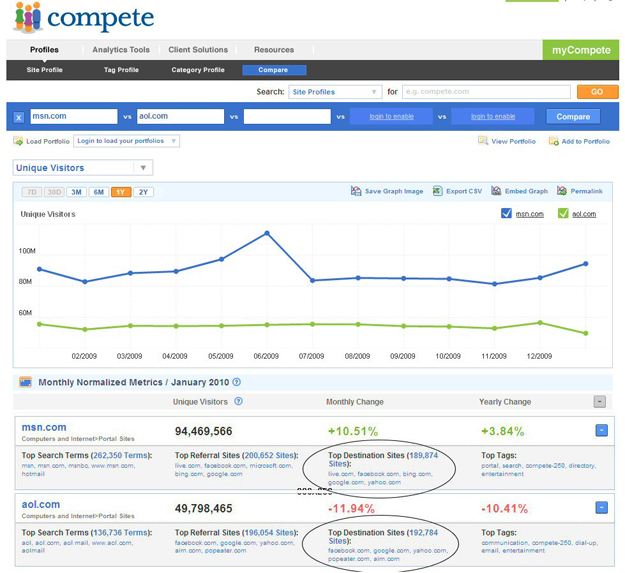Facebook Generates More Website Visitors than Google
According to Web measurement firm Compete Inc., Facebook has passed search-engine giant Google to become the top source for traffic to major portals like Yahoo and MSN, and is among the leaders for other types of sites.
Being a member of Facebook involves having friends and family share Web links to interesting news stories, photos, videos and Internet sites. This "friend-casting" of information has helped propel Facebook into a major force in directing traffic around the Web.This trend is shifting the way Web site operators approach online marketing, even as Google takes steps to move into the social-media world.
Some experts say social media could become the Internet's next search engine, according to SFGate.
"People are spending less time navigating the Internet on their own and are now navigating the Internet based on their friends' recommendations or their friends' activities," said Dave Yovanno, chief executive of Gigya Inc., a Palo Alto firm that offers social-media services. "That's one of the big trends we started picking up on probably four or five months ago."
 For years, Web content creators had to worry whether they had the proper level of search-engine optimization to make sure search engines listed them among the top results. Now, they have to consider social-media optimization.
For years, Web content creators had to worry whether they had the proper level of search-engine optimization to make sure search engines listed them among the top results. Now, they have to consider social-media optimization.
"Marketers must focus on social marketing in addition to traditional search, as customers have a multi-pronged way of finding information," said Jeremiah Owyang, a Web strategist for the Altimeter Group, a San Mateo consulting firm. "The clear-cut channels of yesteryear are now an intricate set of connections."
Using a snapshot of Web traffic from December, Compete's director of online media and search, Jessica Ong, found that 15 percent of traffic to major Web portals like Yahoo, MSN and AOL came from Facebook and MySpace. The lion's share of that traffic, 13 percent came from Facebook.
Google, which has profited handsomely from directing Web surfers to their destinations during the past decade, was third with 7 percent, just behind e-commerce site eBay, which had 7.61 percent. MySpace was fourth with just under 2 percent.
The numbers are eye-opening because Google used to dominate most Web-referral categories. "I was surprised to see Facebook has become No. 1," Ong said.
In other categories, Compete's data showed Mountain View's Google still on top, but Palo Alto's
Facebook was not far behind. For example, Google accounted for 21.3 percent of referrals to sites catering to movie fans, but Facebook was second with 12.4 percent. And in a video category, Google - which owns YouTube - was first with 22.9 percent, but Facebook was next at 12.7 percent.




Hi,
this is very interesting indeed! It's no secret that Google has been working on expanding their reach beyond search for years now. I remember a meeting with Google's AdWords agency team a couple of years ago in which they acknowledged as much. They explained that user behavior studies they conducted showed that users spend only a very small percentage of their time using search engines and that it is their goal to be the provider of advertising solutions to the web as a whole. With facebook taking over the lead spot as universal web hub, Google can't be happy right now. Add to that the recent negative buzz around buzz ;-)
Facebook and Google,
both of them are good tools and can have their positive and negative sides.
Web users go to Google to search,
Then they go to Facebook to hang out and share,drive traffic from Facebook to their website.
"Both of them are looking for the same thing"
"To figure out how to monetize the traffic source"
Good post to read here!
This makes perfect sense to me. People care much more for the opinions of their friends than the opinions of a complete stranger. Facebook represents the opinions of friends; Google represents the opinions of a stranger. Similarly, when you search something on Google, it doesn't know your past, your preferences, your personality, or your nuances, whereas when you ask a friend, they know all of these things and can base their answer off of what they believe you are looking for. Facebook provides that personal touch that Google is lacking.
Very surprising info. I never cared much about social media but if this is true i have to rethink this.